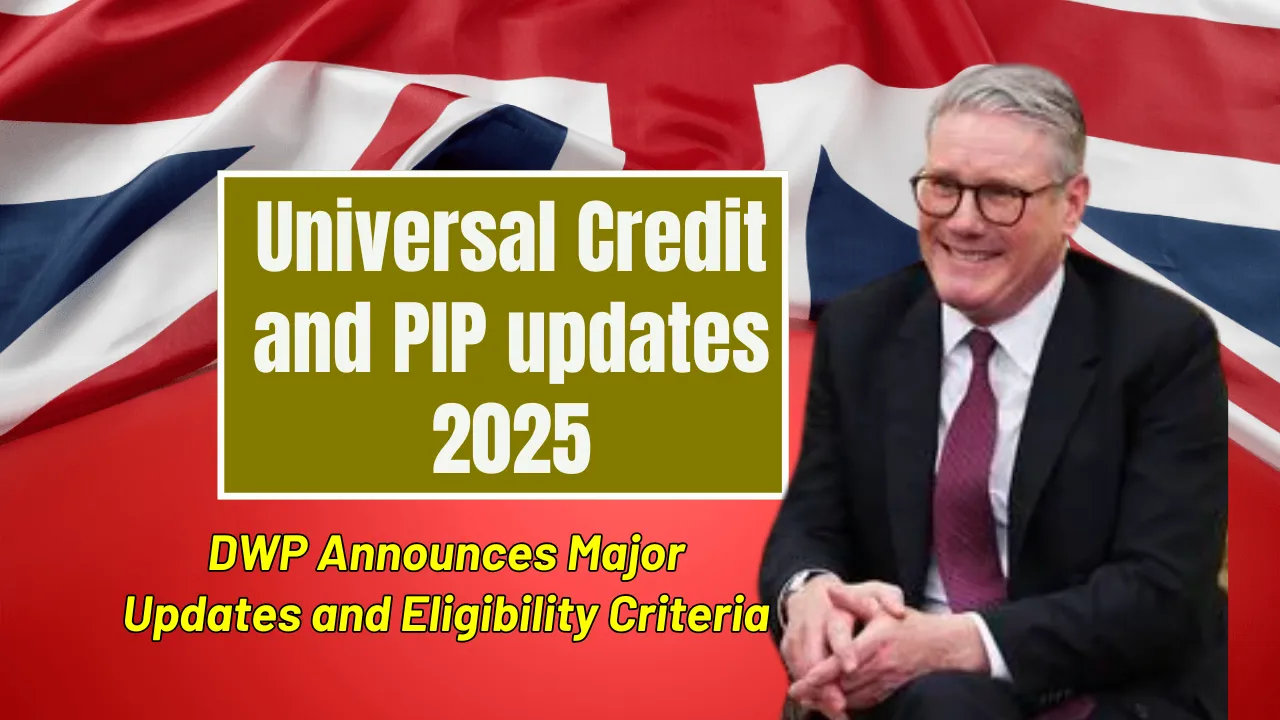Universal Credit and PIP updates 2025: The UK government has unveiled sweeping changes to its welfare system in the form of new reforms to Universal Credit (UC) and Personal Independence Payment (PIP). These major updates, announced by the Department for Work and Pensions (DWP), aim to improve financial aid delivery, reduce barriers for people with disabilities, and create a more personalized benefits system. With cost-of-living pressures still weighing heavily on many families, these changes are timely and crucial.
The Universal Credit and PIP updates 2025 reflect a national effort to simplify the benefits process and offer fairer, more supportive policies for claimants. This article explores the key updates, new eligibility criteria, improved financial support, and how these reforms will affect new and existing claimants across the UK. Whether you’re a parent, carer, or living with a health condition, these changes could have a significant impact on your entitlements in 2025.
Universal Credit and PIP updates 2025
The new Universal Credit and PIP updates 2025 are designed to reflect the real challenges faced by individuals and families who rely on government assistance. With more inclusive eligibility criteria and updated financial support, these reforms promise improved access, faster processing, and enhanced understanding of mental and physical health conditions.
Overview Table: Universal Credit and PIP 2025 Reforms
| Category | Details |
| Announcement Date | May 2025 |
| Implementing Body | Department for Work and Pensions (DWP) |
| Reform Focus | Simplified process, mental health support, increased allowances |
| Universal Credit Updates | Expanded eligibility, flexible job-seeking, higher childcare and carer aid |
| PIP Updates | Improved assessment of hidden disabilities, payment increases |
| Who’s Affected | Low-income individuals, disabled people, carers, parents |
| Rollout Period | Begins April 2025, full integration by year-end |
| Where to Apply | Official site: www.gov.uk |
| Support Channels | UC Journal, DWP letters, GOV.UK account |
Universal Credit Updates for 2025
Universal Credit remains a cornerstone of financial support in the UK. For 2025, the system is being overhauled to offer greater flexibility, fairness, and financial relief to a broader range of claimants. One of the biggest changes is the expanded eligibility that now allows more low-income workers to qualify due to increased income thresholds. A newly introduced income disregard threshold means people can keep more of their earnings before their Universal Credit begins to reduce.
Another significant change is the introduction of tailored work commitments. This means claimants with long-term conditions like anxiety, PTSD, or other chronic illnesses may not be required to meet traditional job-seeking expectations. These new rules will allow for more personalized support and reduce pressure on individuals who face health challenges.
Expanded Eligibility and Income Thresholds
With the Universal Credit and PIP updates 2025, more working individuals with lower earnings will qualify for Universal Credit. For instance, someone earning £1,000 per month will now be able to retain a higher portion of their UC payment, making work more rewarding without instantly losing benefits.
This change is especially helpful for part-time workers and those balancing work with caregiving or health concerns. It aligns the system closer to real-life needs, where income often varies and doesn’t always reflect a person’s financial struggles.
Flexible Work Commitments
Under the 2025 updates, Universal Credit work search requirements will adapt based on individual health conditions. This flexibility supports mental wellness and reduces the risk of stress-related issues caused by rigid work rules. People suffering from PTSD, depression, or long-term illnesses will benefit from fewer pressures and more understanding of their limitations.
Better Family Support
Families with children and those caring for a disabled member will see enhanced financial assistance. Childcare costs covered by UC are set to rise, easing the burden on parents. Carers will receive increased allowances and face fewer job-related conditions, making the benefits system more supportive and fair.
Personal Independence Payment (PIP) Reforms for 2025
PIP is critical for individuals living with physical or mental disabilities, and the 2025 updates are aimed at making the system simpler and more inclusive. The most notable improvement is the wider recognition of hidden disabilities, including conditions like bipolar disorder, autism spectrum disorders, and chronic fatigue syndrome.
The assessment process has been revised to better identify and evaluate these conditions, leading to more accurate decisions and improved support for those who previously struggled with complex and inconsistent evaluations.
Wider Recognition of Hidden Disabilities
With the Universal Credit and PIP updates 2025, hidden disabilities are finally receiving the attention they deserve. Conditions like sensory impairments, depression, anxiety, and neurodevelopmental disorders will now be assessed more consistently. This recognition ensures that those suffering from less visible health problems are not left behind.
Increased Financial Support
Both the daily living and mobility components of PIP will see an increase in 2025. These changes aim to reflect the real-world costs that disabled individuals face, from travel expenses to home support and daily care. While exact amounts will vary by case, the increase is intended to align with inflation and living costs.
Simplified Application System
Another major improvement is the streamlined PIP application process. This will benefit those transitioning from Disability Living Allowance (DLA) as well as new applicants. The new system promises faster decision times, easier paperwork, and clearer steps to help claimants navigate the process with less stress.
What the Changes Mean for You
Whether you’re an existing beneficiary or planning to apply for the first time, these reforms will impact how you interact with the system. Current recipients will be reassessed under the new criteria, and may experience increased support or updated conditions. New claimants will enter into a more modern, accessible benefits system from the beginning.
Parents, carers, and individuals with long-term illnesses will notice relaxed rules and greater financial help. These updates reinforce the government’s mission to make the benefits system fairer and more humane.
FAQs
What is Universal Credit and who qualifies in 2025?
Universal Credit supports low-income individuals and families. In 2025, more people qualify thanks to increased income limits and tailored eligibility rules.
What conditions will now be better recognized in PIP?
PIP will better account for conditions like PTSD, autism, sensory impairments, chronic fatigue, and mental health disorders.
How much will PIP payments increase in 2025?
Both daily living and mobility rates will go up. Final payment amounts will depend on assessment outcomes.
Will I need to reapply under the new rules?
Most current claimants will be automatically reviewed. Some may need to provide updated evidence.
Are there changes for carers under Universal Credit?
Yes, carers will see better financial support and less pressure from job-seeking obligations.
Final Thought
The Universal Credit and PIP updates 2025 represent a major step forward in making the UK’s benefits system more responsive, fair, and humane. Whether you’re struggling with health conditions, raising children, or supporting a loved one, these changes could significantly improve your financial stability and well-being.
Stay informed by regularly checking your UC journal, DWP communications, or logging into your GOV.UK account. Have questions or personal stories? Share them in the comments or explore more articles to stay ahead of these important updates!












